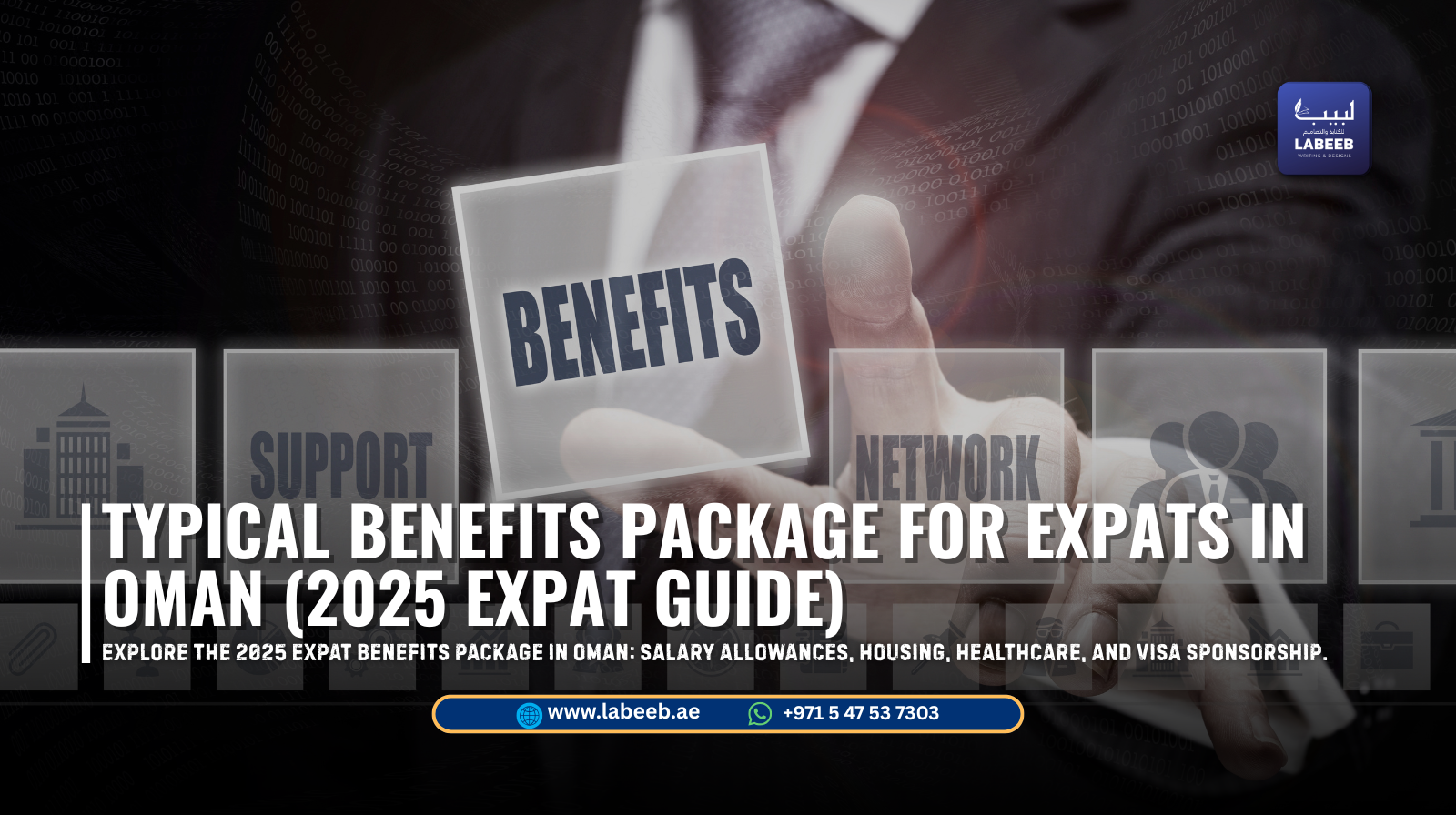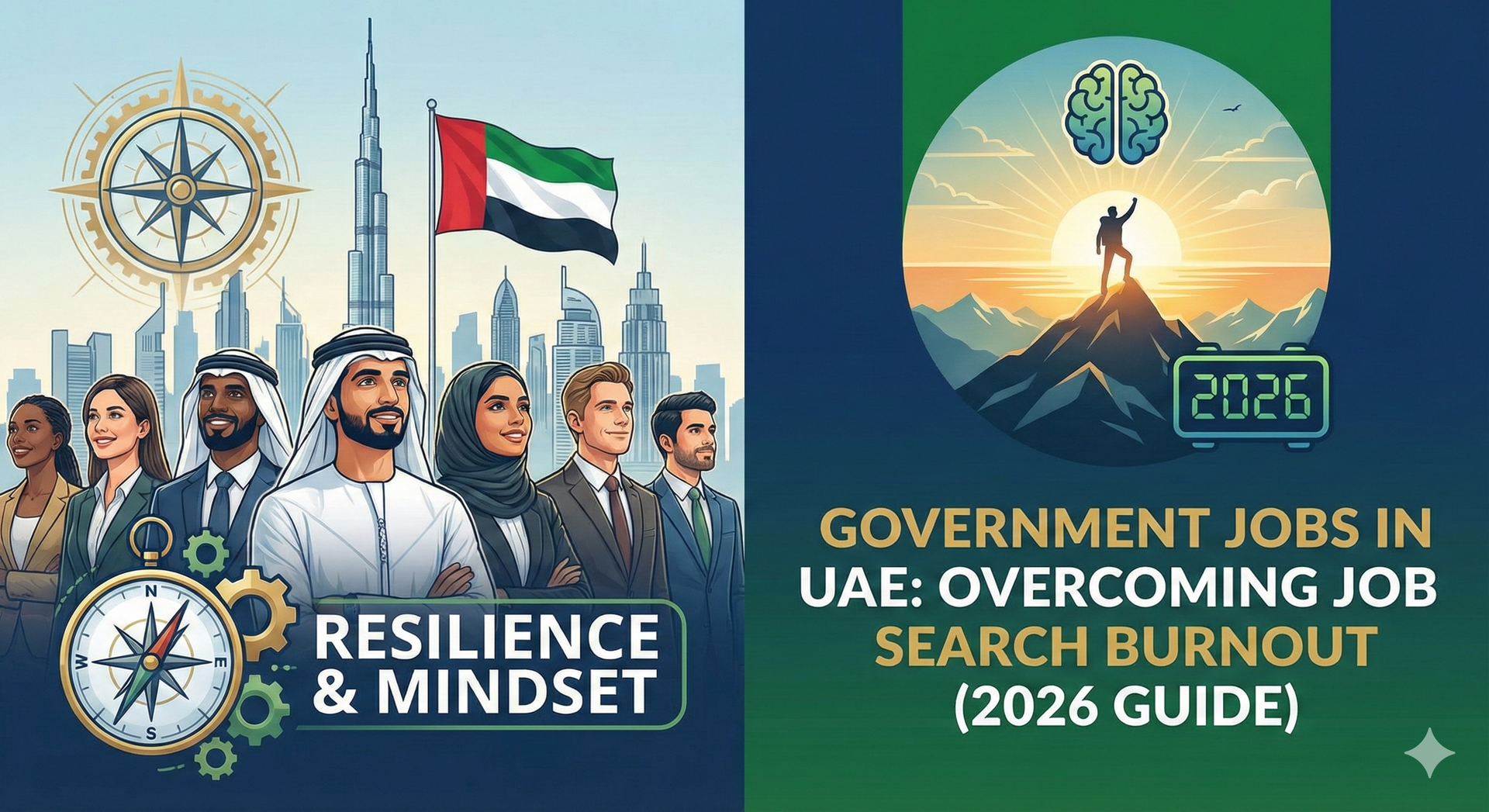Typical Benefits Package for Expats in Oman (2025 Expat Guide)

With its welcoming culture, modern infrastructure, and stable economy, Oman remains one of the most attractive destinations for expatriate professionals in 2025. From engineers and teachers to finance managers and healthcare experts, thousands of expats are choosing Oman for its balanced lifestyle and comprehensive employment benefits.
Unlike many countries where salaries alone define compensation, Omani employers offer complete benefit packages covering housing, healthcare, travel, and family support.
This guide breaks down what expats can expect in a standard Oman employment package, along with insights into visa sponsorship, taxation, and cost of living — helping you negotiate confidently before signing your next contract.
For personalized support creating a professional CV tailored for Oman employers, visit Labeeb Writing & Designs Career Services.
Overview of Expat Employment in Oman
Oman’s labour market continues to grow steadily under Vision 2040, the national plan promoting diversification beyond oil and gas.
According to Times of Oman Business Reports and GulfTalent Oman Employment Outlook 2025:
- Oman’s private sector employs over 1.6 million expatriates, mainly from Asia, the GCC, and Europe.
- Sectors like construction, energy, healthcare, education, IT, and tourism dominate foreign employment.
- Expat benefits packages are among the most balanced in the GCC, offering family-friendly perks and long-term stability.
Employers value experienced professionals who can contribute to Omanization goals while mentoring local staff — meaning strong leadership and communication skills are highly appreciated.
1. Salary and Pay Structure
Expat salaries in Oman are tax-free, with payment made monthly in Omani Riyals (OMR). The amount depends on your sector, experience, and seniority level.
As of 2025:
- Mid-level professionals typically earn between OMR 800 and 1,500 per month.
- Senior managers and directors earn OMR 2,000 to 5,000 per month or more.
- Skilled technicians and educators average OMR 600 to 1,000 per month.
While salaries in Oman may be slightly lower than in Dubai or Doha, the cost of living is more affordable, making it easier to save money.
To strengthen your negotiation position, review Labeeb’s Interview and Salary Coaching Services.
2. Housing and Accommodation Allowance
Most expatriate contracts include either:
- Company-provided housing (apartments or villas near the worksite), or
- A housing allowance paid monthly or annually (often 20–30% of salary).
Employers also cover basic utilities, such as water and electricity, for employees living in company housing.
Major cities like Muscat, Sohar, and Salalah have modern residential communities that cater to international workers, offering amenities like gyms, schools, and shopping centers nearby.
If you’re relocating with family, confirm whether the housing package includes furnished accommodation or relocation assistance.
3. Transportation and Travel Benefits
Omani companies usually provide:
- A transport allowance (OMR 50–150 monthly), or
- A company vehicle for senior professionals.
Annual airfare tickets are also included for expats and their dependents. Some employers even offer two tickets per year for international roles that require frequent travel.
If you’re employed in remote regions (like oil and gas fields), the company often arranges free transport to and from work.
4. Health Insurance and Medical Coverage
Healthcare coverage is a standard part of every expat contract in Oman.
Employers are required by law to provide comprehensive health insurance through recognized providers. Coverage typically includes:
- Outpatient and inpatient treatment
- Emergency medical care
- Maternity and dental (in some packages)
- Access to both public and private hospitals
Dependents are also eligible for medical coverage, although the terms vary depending on the employer’s policy.
For highly specialized or senior professionals, companies may include international medical insurance that allows treatment abroad.
5. End-of-Service Benefits
Like other GCC countries, Oman follows a gratuity system under its Labour Law.
After completing at least one year of continuous service, employees are entitled to:
- 15 days’ basic salary per year for the first three years.
- 30 days’ salary per year for each year thereafter.
This end-of-service benefit is paid upon resignation or contract completion and serves as a long-term financial reward for loyal employees.
Professionals planning long-term relocation should confirm how gratuity is calculated and paid in their contract.
6. Annual Leave and Holidays
Most expatriates in Oman enjoy:
- 30 days of paid annual leave after one year of service.
- Public holidays (around 9–12 days annually) for national and religious occasions.
Employees are encouraged to schedule leave during non-peak operational months, and many companies offer flexible arrangements for family visits abroad.
Top employers also provide leave travel allowances to cover airfare home during vacations.
7. Family Visa and Education Support
Oman is known for its family-friendly work environment. Expatriates earning above a set threshold (usually OMR 600–800 per month) can sponsor their spouse and children.
Some employers offer:
- Family visa sponsorship and renewal fees.
- Education allowance for children enrolled in international schools.
- Assistance with dependent medical insurance and housing upgrades.
Before signing your contract, ensure these benefits are clearly stated — especially if you plan to relocate with dependents.
8. Working Hours, Overtime, and Flexibility
The standard workweek in Oman is 45 hours (Sunday to Thursday), with Fridays and Saturdays off.
During Ramadan, working hours for Muslim employees are reduced by two hours per day.
Overtime pay applies if employees work beyond the legal limit — typically 1.25x to 1.5x the normal hourly rate, depending on the role and timing.
Remote work policies are gradually increasing, particularly in administrative and tech sectors.
9. Relocation and Contractual Support
Many companies assist expats with relocation by covering:
- Initial travel expenses
- Temporary accommodation upon arrival
- Settling-in allowance (one-time payment)
- Shipment of household goods
For senior positions, relocation packages may include visa assistance for dependents and legal documentation handled by the HR department.
To ensure you negotiate confidently, explore Labeeb’s Career Support and Consultation Services.
10. Work Visa and Sponsorship in Oman
All expatriates must have an employer-sponsored work visa to work legally in Oman.
The process involves:
- Employer obtaining labour clearance from the Ministry of Labour.
- Visa application approval from the Royal Oman Police (ROP).
- Medical tests and residence card issuance after arrival.
Most visas are valid for two years and renewable. Employers cover the cost of your visa, medical tests, and residence card.
Official guidelines can be found on the Oman Ministry of Labour website.
Tips for Negotiating a Strong Expat Package
- Research salary benchmarks using trusted sites like GulfTalent or Bayt before your interview.
- Ask for a full breakdown of the package, including allowances and insurance coverage.
- Clarify relocation and schooling benefits if moving with family.
- Negotiate performance bonuses instead of fixed pay increases.
- Request written confirmation of all benefits before signing your contract.
If you’re unsure how to approach this, Labeeb’s Interview Preparation Service offers role-play coaching and contract review advice.
How Labeeb Writing & Designs Supports Oman Professionals
At Labeeb Writing & Designs, we help professionals build strong, trustworthy profiles for employers across Oman and the GCC.
Our specialized services include:
- Professional CV Writing for Oman Employers
- ATS Resume Optimization
- Cover Letter Writing for Gulf Companies
- LinkedIn Profile Enhancement
- Interview and Career Coaching
- Expert Relocation & Career Support
We understand GCC employment culture and know how to position your experience to appeal to Oman’s top employers.
Conclusion
Oman continues to be one of the most rewarding destinations for expatriate professionals seeking stability, balance, and security. With comprehensive benefits packages covering housing, health, and family support, working in Oman offers more than just a salary — it’s a lifestyle investment.
Before accepting any offer, review the entire compensation package, clarify benefits, and ensure your documents are professionally prepared.
Partner with Labeeb Writing & Designs to present your best self — from resume to relocation.
FAQs
1. Do all employers in Oman provide housing allowance?
Yes, most private-sector employers either provide housing or pay a monthly allowance to cover rent.
2. Is healthcare free for expats in Oman?
No, but every employer must provide comprehensive health insurance for their employees.
3. How is end-of-service gratuity calculated?
Fifteen days’ salary per year for the first three years and 30 days per year thereafter.
4. Can I sponsor my family while working in Oman?
Yes, expats meeting the minimum salary threshold can sponsor their dependents for residence visas.
Arabic Summary (خلاصة بالعربية)
تُعَدّ سلطنة عمان من أكثر الدول جذبًا للوافدين في عام 2025 بفضل بيئة العمل المستقرة والمزايا الشاملة التي تقدمها الشركات، مثل السكن والتأمين الصحي وتذاكر السفر ومكافأة نهاية الخدمة. يوضّح هذا الدليل تفاصيل الحزم الوظيفية النموذجية للوافدين في عمان ونصائح التفاوض على عقد عمل مثالي. يمكنك الاعتماد على Labeeb.ae لكتابة سيرة ذاتية احترافية تعزز فرصك في سوق العمل العماني والخليجي.







